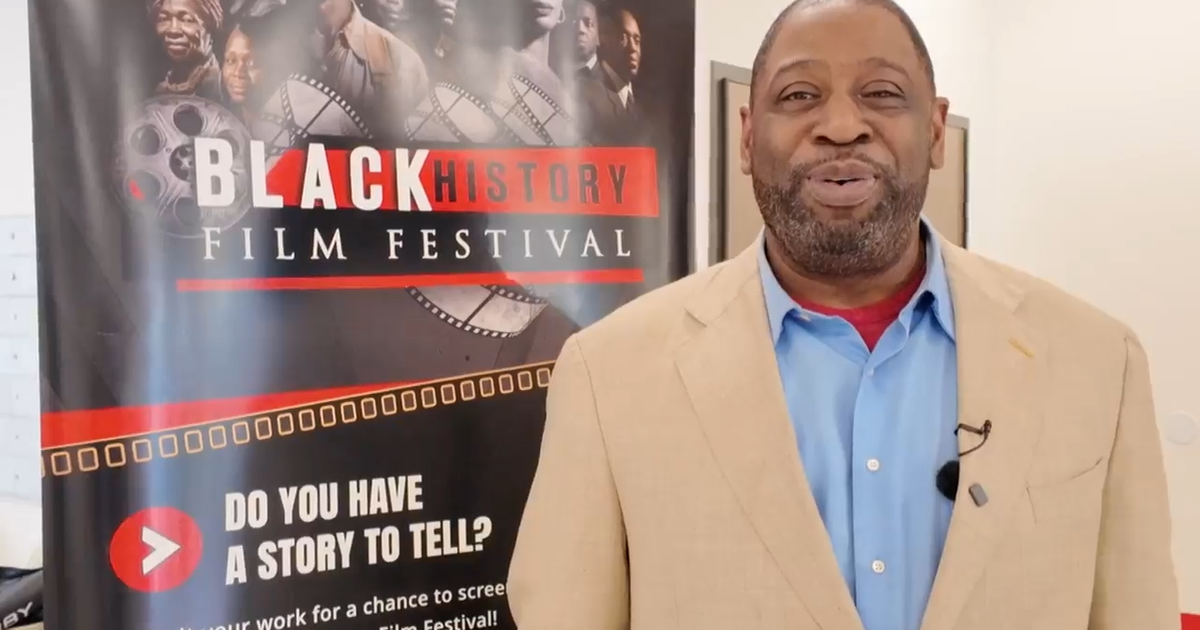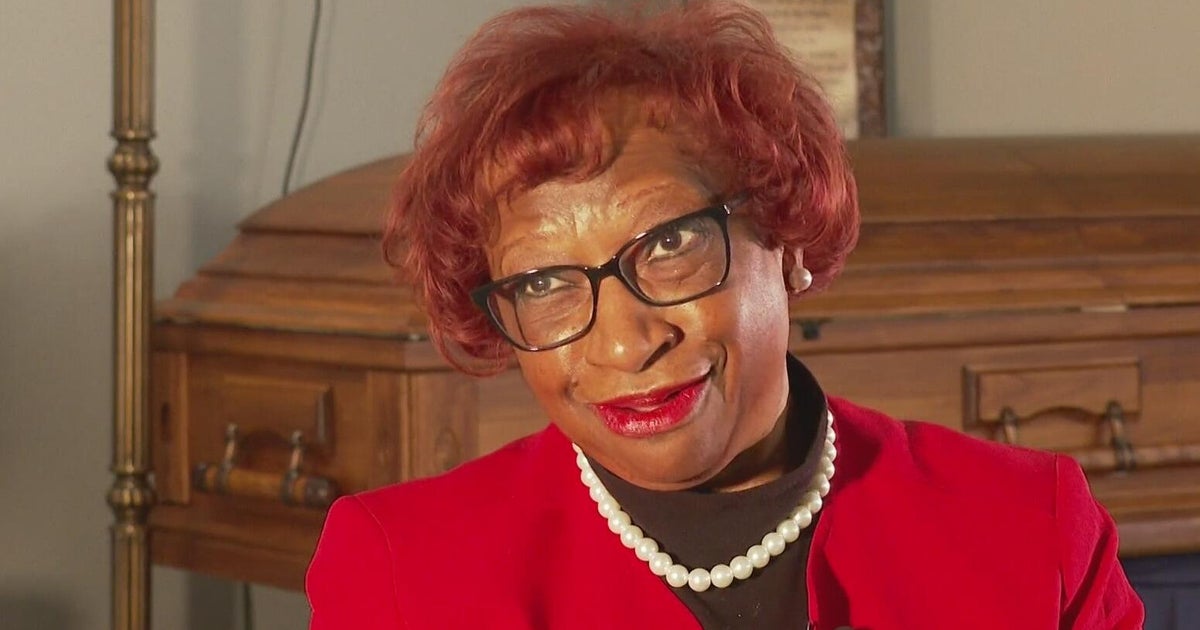The stunning revelations in biography of Dr. Martin Luther King Jr.
CHICAGO (CBS) -- "King: A Life," the new biography of Dr. Martin Luther King Jr., was on virtually everyone's top 10 list of 2023 – including the Washington Post, the Chicago Tribune, and Time Magazine.
"No book could be more timely than Jonathan Eig's sweeping and majestic new King," wrote Will Bunch in the Philadelphia Inquirer.
Author Jonathan Eig was born in Brooklyn and raised in Monsey, New York in Rockland County north of New York City. But he attended the Medill School of Journalism at Northwestern University and has called Chicago home for many years.
He wrote "King: A Life" in his home office, which doubles as the laundry room.
Eig wrote about a persistent social problem in the book: "But in hallowing King, we have hollowed him - from Montgomery to Chicago along those streets named Martin Luther King Jr. Drive and Martin Luther King Jr, Avenue and Martin Luther King Jr. Highway, poverty and segregation rates remain much higher than local and national averages."
Dwight Garner of the New York Times called "King: A Life" the "new definitive biography" – and also called the book "supple, penetrating, heartstring-pulling, and compulsively readable." Mark Whitaker of the Washington Post said the volume was "infused the narrative energy of a thriller."
Did Eig know he was writing a "new definitive biography" for Dr. King? Actually, he says he did.
"I knew how important it was to tell King's story, and I knew how relevant it was to the world we're living in today," said Eig, "because look what's happening to us. We're still fighting over racism."
Eig did not mean he knew critics would laud him with such praise – though he is not disappointed that they did.
"No, I didn't know if people were going to like the book," he said, "but I felt like I did a pretty good job of it. So I was hoping the critics would like the book."
Eig spent six years – including an entire pandemic – in the laundry room writing. He was buried in unfolded clothes as he unearthed transformative firsts about Dr. King – many via newly released government documents. The book reveals, and it debunks.
Edwards: "Did you find yourself in this process being like holy cow, this is a bombshell?"
Eig: "Absolutely."
Playboy interview fabrication
One well-known purported quote from Dr. King that Eig debunked involved Chicago-founded Playboy Magazine. In the quote, Dr. King is alleged to have said, "Malcolm has done himself and our people a great disservice."
"I discovered that the quote from Martin Luther King about Malcolm X - this incendiary quote where he blasts Malcolm X - was fabricated. Playboy Magazine and Alex Haley made up the quote and attributed it to King. And when I discovered that, I immediately called Peniel Joseph, who's written this book about the relationship between King and Malcolm. And I said: 'This is a big deal, right? And he was like, 'Oh my God, yeah. And I've been teaching that quote to my college students for 20 years. I've been teaching all through Yeah, I've been teaching a lie. And now we know that the white media propagated this myth that King was critical of Malcolm X."
Generations later, we now know Haley – known for "Roots" and for co-authoring "The Autobiography of Malcolm X" - used a King quote assailing the Nation of Islam's urging of violence, and made it appear as if King was slamming Malcolm X.
The purported quote goes on to say, "Fiery, demagogic oratory in the Black ghettos, urging Negroes to arm themselves and prepare to engage in violence, as he has done, can reap nothing but grief."
According to an unedited transcript that Eig located, it turned out that Dr. King made the comment about "fiery, demagogic oratory" earlier in the interview and the remark had nothing to do with Malcolm X, according to Smithsonian Magazine.
We now know, to the contrary, King was actually deferential to Malcolm X in the Playboy interview, saying of Malcolm X, "Maybe he does have some of the answer."
In that case, Eig wrote, and righted, history. And there were other such instances.
FBI's obsession with King's sex life
Edwards: "You have proven, definitively, the FBI was out to get him - were they not?"
Eig: "At one point, they encouraged him to commit suicide."
Originally, the FBI wanted to know if King consorted with communists. The FBI only found he was cheating on his wife.
Eig: "So they become obsessed with King's sex life. They are using it to try to blackmail him, to try to get him to quit his position. They're even using it to try to encourage Coretta to divorce him.
"So they take a set of tapes. They make up 'greatest hits' from his hotel rooms - because they're also putting bugs in the hotel room, and the lamps of his hotel rooms, and they send that tape to his home - and along with a note saying: 'You are going to be exposed. We know you're a fraud. The whole world will know you're a fraud. The only way out for you is suicide.' And they give him a deadline by which they expect him to either quit or commit suicide."
The note was supposedly written by a Black man with animus toward King, but it was really the FBI – and King knew it.
"And he knows immediately that it came from the FBI and just refuses to be bullied by them," said Eig.
This was an FBI supported by President Lyndon B. Johnson – the greatest legislator of Civil Rights.
"It's very important that we remember that the same government that has created a national holiday for King was also out to destroy him," said Eig.
The record shows Johnson's administration also threatened to undermine everything King.
"I discovered that LBJ's secretary kept in her safe the most personal letters that came from [FBI Director] J. Edgar Hoover," Eig said. "And Hoover was writing directly to LBJ, sometimes two or three times a week - just on the subject of MLK - 'He's writing an article about this. He's speaking here. He's going to say more about the Vietnam War - and lots of details about the sex life; about King's personal life, like they were obsessed with it; almost as if they were just voyeurs."
It proves leaders' lives aren't a binary of hero versus villain, sinner versus saint – and Eig seems to pinpoint exactly where Dr. King fits on life's grayscale.
"The flaws don't diminish from his greatness. The flaws just show that he was human, which to me makes him greater - because he accomplished these things as a mortal," said Eig. "He had doubts. He had failures. And I wanted, I think, readers can handle that."
Dr. King's experience in Chicago
Dr. King visited Chicago several times and moved his family into a dilapidated apartment in a disinvested area of the city's West Side in January 1966. That summer, Dr. King began leading marches into all-white neighborhoods in support of fair and open housing citywide.
"When he got here, he felt like the city was more racist than he had imagined," said Eig.
On Aug. 5, 1966, Dr. King was struck with a rock during a march for open housing in the Marquette Park neighborhood – as an angry mob of white protesters blocked the streets. The impact was so great t that he was knocked down to the ground. But he got up and continued to march. Bricks and bottles followed, and a full-scale riot broke out with dozens of injuries and arrests.
"I've never seen - even in Mississippi and Alabama – mobs as hostile and as hate-filled as I've seen in Chicago," Dr. King told reporters at the time.
During Dr. King's 1966 visit, Mayor Richard J. Daley promised change. Late in August, Dr. King announced an agreement had been reached for city leaders to promote fair housing, the Encyclopedia of Chicago recalls.
"And then as soon as he left town, the city, you know, pretty much abandoned those promises that they made to King," said Eig. "So I think he was deeply upset. And I think that his relationship with Mayor Daley [Sr.] was a was a fraught one. Daley clearly was just looking to get rid of King."
About Jonathan Eig
As for Eig himself, he interviewed Mayor Harold Washington as a college student at Medill at Northwestern – from which graduated in 1986. He went on to write for The New Orleans Times-Picayune and the Dallas Morning News before returning to Chicago for the Wall Street Journal in the 1990s.
Eig raised his kids in Chicago – on the second story of a three-story walkup on the city's North Side, where he still lives.
Eig was in Chicago when his first bestseller - the 2005 book, "Luckiest Man: The Life and Death of Lou Gehrig" - became a hit. It reached No. 10 on the New York Times bestseller list and on the Casey Award, and an adaptation is coming to Apple TV.
Eig also wrote, "Ali: A Life," a biography of Muhammad Ali. The 2018 book won a 2018 PEN America Literary Award – and he was also a consulting producer for Ken Burns' PBS series "Muhammad Ali."
Eig's fourth book, "The Birth of the Pill," was adapted into a play by the TimeLine Theatre in Chicago, his website notes.
And now, he has taken on Dr. King's story.
Edwards: "You're a white Jewish man. There's got to be some people who say…"
Eig: "I've been asked that question. I've been on the road now for seven, eight months talking about this book. And every once in a while, someone will say, what's up with the white Jewish guy writing about the greatest Black Christian leader in our country's history?" Or before that, I wrote about the greatest Black Muslim in American history in Muhammad Ali. And I think it's a legitimate question. And I think that for a biographer, you know, we have a special responsibility to be humble about who we write about."
"And I began really by asking a lot of King's friends and associates whether they would talk to me, whether they thought it was important, whether they would support me in writing such a book. And ultimately, readers will judge whether you did it right."
Eig concluded his interview with CBS 2 by reading some more of "King: A Life."
"Today, his words might help us make our way through these troubled times, but only if we actually read them - only if we embrace the complicated king, the flawed king, the human king, the radical king. Only if we see and hear him clearly again, as America saw and heard him once before," Eig read from his book. "'Our very survival,' he wrote, 'depends on our ability to stay awake, to adjust to new ideas, to remain vigilant, and to face the challenge of change. Amen.'"











